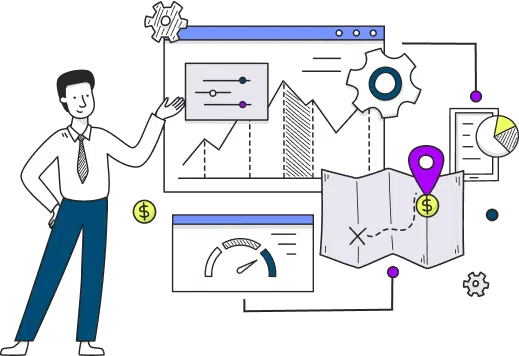Traditional Bank vs. Alternative Lender
Which is Best for Your Small Business?
The one ingredient every small business needs is capital – capital to grow, even out cash flow, and meet short-term expenses. The question of where you go to get a business loan, however, can be confusing, especially when it comes to choosing the type of lender. When it comes to financing, small business owners have two main choices for a lender: a traditional bank and an alternative business lender. Both come with pros and cons, different interest rates, different speeds at which funds are delivered, and different loan amounts offered so it’s important to fully know what your needs are and which type of lender is best suited for you.
What are Alternative Lenders for Small Businesses?
Most business owners know they can walk into a brick-and-mortar bank and apply for a traditional bank loan, but since the 2008 financial crisis, alternatives have become increasingly popular. There are financial institutions that operate outside of the traditional banking sphere that typically offer financing applications entirely online, while giving borrowers the opportunity to speak to lending experts via phone or online channels. They are just as legitimate as banks and offer distinct advantages over them.
Rise in Popularity
While alternative lenders have been around since the late 1990s, their popularity began to soar after the 2008 financial crisis when many banks struggled for capital and tightened their requirements for getting loans.
While alternative lenders were relatively obscure before the 2008 financial crisis hit, alternative business loans rose in popularity during the Great Recession. Before 2008, alternative lenders represented just 7% of the small business lending market, according to a study by the Federal Reserve. That figure rose to 12% after 2008. In 2016, 19% of small business owners turned to online lenders for their financing needs, and by 2019, the number jumped to 32%.
What is a Traditional Bank?
Traditional banks are the financial institutions in your neighborhood that can be regional or local banks or branches of larger banks such as JPMorgan Chase or Bank of America. They offer you face-to-face service with a loan officer specializing in helping small businesses. Depending on your FICO score, they usually offer slightly better interest rates than alternative lenders. Borrowing requirements, however, tend to be more rigid than alternative lenders, especially now that we’re in a high-interest-rate environment in which lending requirements have significantly tightened.
Also, the application process is typically more complicated than with alternative lenders and, once approved, there could be a relatively long waiting period to get your funds. Still, if you have an excellent credit score, you most likely will notch a lower interest rate, which could save you significant money when it comes to your total cost of capital.
Traditional Banks: Pros and Cons
Traditional banks are still the most popular types of lenders for small businesses and offer several advantages over alternative lenders, but there are also significant drawbacks as well. Small business owners should be aware of the pros and cons of using their neighborhood bank for a loan:
Pros
- Lower interest rates. While every bank is different, most offer lower interest rates on bank loans than alternative lenders. However, as interest rates are currently high right now, the difference in the interest rates on a small business bank loan between traditional and alternative lenders has tightened.
- Face-to-face service. Many small business owners like to see a familiar, friendly face when they walk into a bank – a lending expert who is already familiar with their business – and this is a significant advantage traditional lenders have over their alternative counterparts.
- Direct product offerings. Many traditional banks directly offer a full suite of financing products to small businesses, such as bank loans and equipment financing. Meanwhile, most alternative lenders are usually funded by asset-backed securities, so may not have the capital to directly offer a full suite of financing products, such as business lines of credit. This allows small business owners to directly negotiate the terms of their loans with the lending officer. Many alternative lenders, however, typically partner with several lenders to offer you a marketplace of financing options that they don’t directly offer.
- Offers other financial services. Small business owners can simplify things by having all of their financial needs met under one roof. This includes having a business savings and checking account, as well as a business credit card, all with one institution. Most traditional banks can provide this to you.
Cons
- Stricter lending requirements. While every lender has slightly different requirements, traditional banks generally have strict requirements for small business loans. You’re often going to be turned down if you don’t have an excellent FICO score (700 or higher). Also, to get a bank loan, your business usually needs to have higher annual revenue than what an alternative lender might want. Alternative lenders usually have shorter applications with fewer requirements.
- Longer application process. Traditional banks often require longer application processes than alternative lenders since they are generally more risk-averse.
- Slower funding times. In some cases, if you are approved for a loan from a traditional bank it could take several days or even weeks to get your funds.
- May be Cumbersome to shop around. If you were shopping for an expensive item such as a new car, you’d probably want to visit several dealerships to get the best possible price. The same holds true for a small business loan. Shopping around for a loan from a traditional bank, however, means you may have to physically visit several local banks to get the best possible deal, and small business owners might not have the time to do that. Many large banks allow you to compare offers online. However, since alternative lenders operate almost entirely online, all you need is your laptop and an internet connection to compare offers.
- Systemic risk. Systemic risk is essentially the risk that banks may collapse due to declining economic conditions. Banks shut down during the credit crunch of 2008, and recently, as interest rates have gone up, banks such as Silicon Valley Bank and Signature Bank were taken over by the Fed earlier this year in high-profile collapses. While this doesn’t happen very often, it’s still a risk when working with a traditional bank.
Alternative Lenders: Pros and Cons
Alternative lenders have become a legitimate borrowing choice for small business owners since the Great Recession, especially when small business lending from traditional banks dropped by some 40% in 2009. These lenders offer significant upsides for small businesses, but they also carry some downsides as well. Here are some of the pros and cons of using an alternative lender:
Pros
- Relatively simple application process. Applying for small business financing from an alternative lender typically takes only a few minutes, and it can all be done online. With a traditional bank, there is usually far more paperwork involved and in many cases with regional banks, you need to visit a location as part of the application process.
- Fewer requirements. Alternative lenders primarily judge you by your FICO score and cash flow history and require minimal paperwork compared to a traditional bank. Alternative lenders also sometimes require fewer years in business and less annual revenue than a traditional bank. Additionally, loan approval rates from alternative lenders remain far higher than traditional banks. If you’ve been turned down for a loan by a traditional bank because of a borderline credit score (let’s say in the 660 to 680 range), then you may still qualify for a business loan with an alternative lender if you have a strong cash flow history.
- Different Financing Products. In addition to traditional business financing products, such as short-term loans, long-term loans and equipment financing, alternative lenders offer some financing options that banks do not. Including:
- Revenue-based financing. Revenue-based financing is when a lender gives your small business a lump sum of cash in exchange for a portion of your future receipts – a practice often referred to as factoring. This type of financing is often used when a small business needs cash for an emergency or to finance an unexpected growth opportunity. Most traditional banks don’t offer this, but many alternative lenders do, giving you another option when it comes to financing.
- Factoring. Factoring is a form of financing offered mainly by alternative lenders. A financing tool such as invoice factoring, for example, can give you cash based on your outstanding invoices. While this can be an expensive way to get quick cash, it is an example of the types of alternative financing that you can get with many online lenders.
- Rapid funding. If you qualify for financing with an alternative lender, you could receive your funds in as little as 24 hours, whereas with many traditional banks it could take several days or even weeks to receive your funds.


